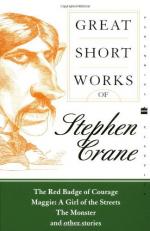|
This section contains 4,778 words (approx. 16 pages at 300 words per page) |

|
SOURCE: Nagel, James. “The Significance of Stephen Crane's ‘The Monster.’” American Literary Realism 31, no. 3 (spring 1999): 48-57.
In the following essay, Nagel provides historical information about “The Monster” and discusses multiple themes in the story.
William Dean Howells called Stephen Crane's “The Monster” the best short story ever written by an American, and few people in the 1890s knew more about the national literature than did Howells.1 In many ways, it is the most complex work in the Crane canon, at once a children's tale, a grim social satire, an ambitious study of ethical responsibility, a painful examination of race in America, a devastating account of the village virus. No other work of short fiction in the decade was more important thematically, and nothing until William Faulkner's “The Bear” so enriched the genre in the United States. Indicative of the strong responses to “The Monster,” Joseph Conrad told Crane...
|
This section contains 4,778 words (approx. 16 pages at 300 words per page) |

|


